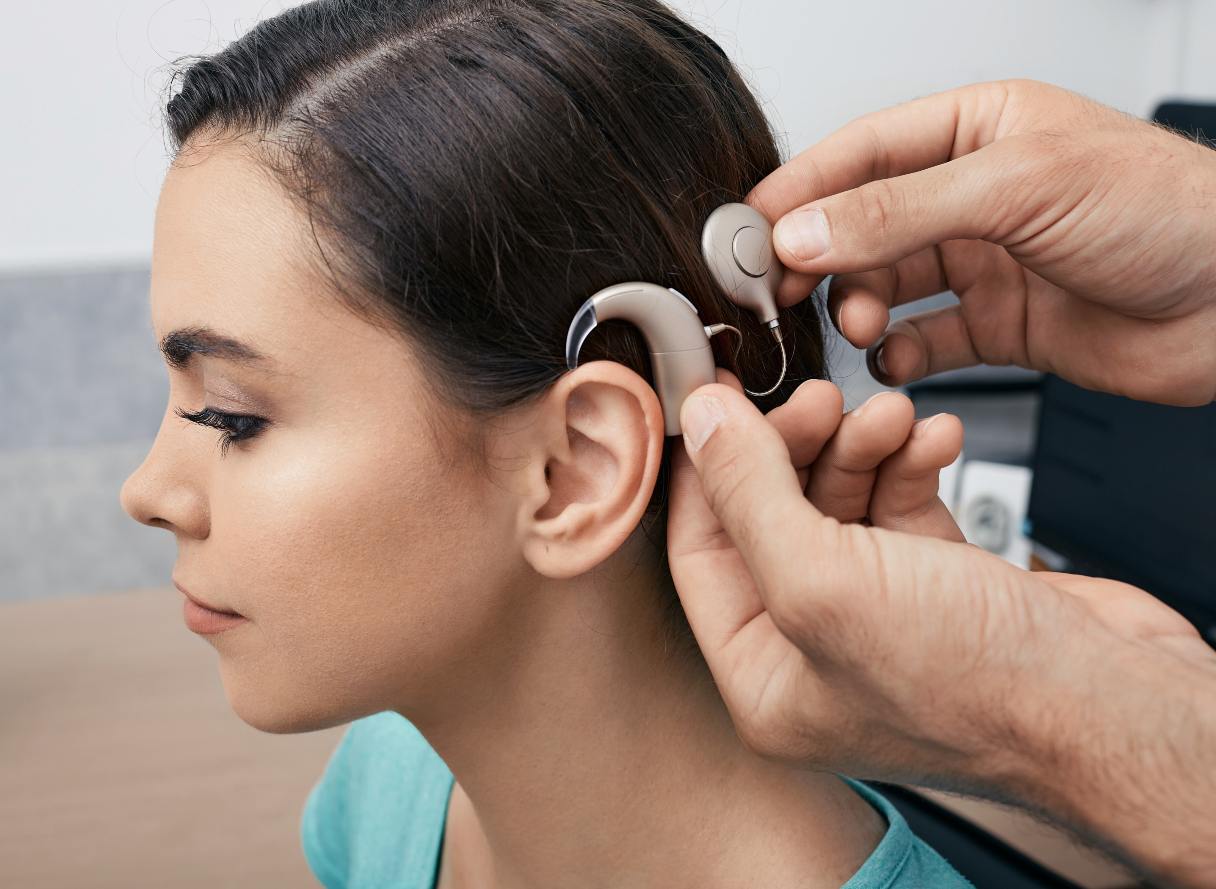If you're experiencing problems with your hearing, you're not alone. Approximately 15% of all Americans over the age of 18 experience some degree of hearing loss, with the greatest amount occurring in those over 60.1
To help improve your hearing, several non-surgical and surgical options are available for different types of hearing loss, including cochlear implants. Learn more about how cochlear implants work, whether you or your child may be a good candidate, and how much you can expect to pay.
What Is a Cochlear Implant?
The cochlea is part of the inner ear that controls how well you hear and interpret sounds. Cochlear implants help improve the ability to hear for individuals with severe hearing loss resulting from inner ear damage.2
A cochlear implant is a surgically implanted electronic hearing device that consists of two components: an external microphone, sound processor and transmitter system; and an implanted receiver and electrode system that stimulates the cochlea.2
The sounds you hear through a cochlear implant aren't exactly like they are with normal hearing. However, with rehabilitation and training, you should be able — within three to 12 months — to understand the majority of the speech around you, leading to a better quality of life.2
Cochlear implants vs. hearing aids
Cochlear implants work differently from hearing aids. Hearing aids help you hear better by increasing the volume and clarity of sounds.2 A cochlear implant is surgically placed under the skin to stimulate the nerve endings in the cochlea, providing a sense of sound to individuals who are profoundly deaf or severely hard of hearing.2
Types of cochlear implants
The types of cochlear implants available depend on where the external sound processor is located. These include:3
- Behind the ear
- On the scalp
- Attached to clothing (especially for children)
How Much Does a Cochlear Implant Cost?
The national average cost* of a cochlear implant in the United States is $51,072 but can range from $39,475 to $98,195.4 Several factors can impact the cost, including brand and model of the implant, location of the clinic and the surgeon's expertise, surgical and hospital fees, cost of follow-up care and programming adjustments and any additional therapies, tools or equipment needed.4
Calculate the cost of a cochlear implant near you*

Explore procedure costs in your area
Average cost of a cochlear implant by state/district
Below is the average cost* of a cochlear implant for all 50 states and the District of Columbia.4
| State/District | Average cost |
|---|---|
| Alabama | $43,752 |
| Alaska | $62,393 |
| Arizona | $51,427 |
| Arkansas | $44,519 |
| California | $62,265 |
| Colorado | $52,085 |
| Connecticut | $54,827 |
| Delaware | $51,044 |
| District of Columbia | $63,434 |
| Florida | $51,007 |
| Georgia | $46,493 |
| Hawaii | $74,784 |
| Idaho | $52,195 |
| Illinois | $48,302 |
| Indiana | $46,438 |
| Iowa | $44,629 |
| Kansas | $45,451 |
| Kentucky | $47,041 |
| Louisiana | $47,754 |
| Maine | $51,153 |
| Maryland | $61,077 |
| Massachusetts | $59,597 |
| Michigan | $47,096 |
| Minnesota | $48,247 |
| Mississippi | $42,820 |
| Missouri | $44,903 |
| Montana | $50,331 |
| Nebraska | $45,835 |
| Nevada | $50,550 |
| New Hampshire | $55,210 |
| New Jersey | $55,759 |
| New Mexico | $46,164 |
| New York | $55,649 |
| North Carolina | $47,644 |
| North Dakota | $46,877 |
| Ohio | $48,357 |
| Oklahoma | $43,423 |
| Oregon | $55,375 |
| Pennsylvania | $49,837 |
| Rhode Island | $54,827 |
| South Carolina | $47,973 |
| South Dakota | $47,206 |
| Tennessee | $45,945 |
| Texas | $47,261 |
| Utah | $51,702 |
| Vermont | $52,798 |
| Virginia | $50,112 |
| Washington | $54,936 |
| West Virginia | $44,793 |
| Wisconsin | $47,535 |
| Wyoming | $49,234 |
A hearing transmitter is the external device that works with cochlear implants to send sound signals from the environment to the implant inside the ear, which then processes and transmits these signals to the auditory nerve, allowing you to hear.
The national average cost* of a transmitter is $86 but can range from $68 to $162.4 That cost may be affected by the brand and model of the transmitter, whether it's a replacement or first-time purchase, and service plans and warranties, among other factors.4
Insurance Coverage for Cochlear Implants
Your health insurance policy may cover your cochlear implants — 90% of policies do cover them.5
There are several things to consider regarding insurance and cochlear implants:
- Cochlear implants are typically covered by Medicare, Medicaid and the Veterans Affairs.6
- It will depend on the level of hearing loss you have, the type of implant your doctor recommends and the level of benefits your plan offers as to whether or not your insurance covers your implant.7
- Medicaid may not cover the cost of cochlear implants in certain states for those over the age of 21.6
- Medicare covers approximately 80% of the costs of cochlear implants.6
- Medicare, Medicaid and most private health plans cover therapy follow-up after implantation.5
- Prior authorization from the insurance company is required before surgery to ensure that your costs are covered.7
- You may still be responsible for copays, coinsurance and deductibles.7
Who Is a Good Candidate for a Cochlear Implant?
Cochlear implants are designed for adults and children with hearing loss who aren't helped with traditional hearing aids, and for those with moderate, profound and severe hearing loss.2 They work best for those who are:8
- Experiencing hearing loss in one or both ears
- Having trouble communicating with others
- Healthy enough for surgery
- Over 9 months old9
- Wearing hearing aids but don't understand speech as much as they'd like
- Able to participate in rehabilitation after surgery
How Long Do Cochlear Implants Last?
A cochlear implant is a significant financial investment, but it can last a lifetime.10 Young children don't ever grow out of their implants.9 You may need to periodically replace the external processor attached to the implant if it becomes damaged or you wish to upgrade it.10 The external part of the device typically lasts between five and 10 years.10 However, manufacturers design new external processors to work with older implants, which is why the implants can last so long.11
How Does Cochlear Implant Surgery Work?
If you have seen a doctor due to problems with your hearing, they will send you for in-depth auditory and vestibular testing, along with imaging, to determine whether or not you have moderate, profound or severe hearing loss. Depending on your results, your doctor will recommend a cochlear implant or another type of hearing aid.2
Preparation
You won't need to arrange for a hospital stay, as this is an outpatient procedure, which means you'll be able to go home on the same day. However, there are things you will need to do before surgery:12
- Arrange for someone to bring you to and from the hospital or surgery center. You'll be under general anesthesia during the procedure and will be given pain medication afterward, so you won't be able to drive home.
- Ask your doctor about all your medications, including vitamins and supplements. They may advise you to stop taking certain medications, such as blood thinners, prior to surgery.
- Bathe as directed by your doctor prior to surgery.
- Remove all jewelry, piercings and contact lenses before surgery.
- Stop eating and drinking before surgery, as instructed by your doctor.
Procedure
During your surgery, you'll be put under general anesthesia, so you won't be awake for the procedure. The surgery itself takes about two hours.13
To perform the surgery, your doctor will:13
- Make an incision behind your ear
- Form an opening in the mastoid bone
- Create a small opening in the cochlea
- Thread the electrodes of the device into the cochlea
- Place the internal processor behind the ear, between the muscle and the bone
- Stitch the incision closed to leave the implant under the skin
Is Cochlear Implant Surgery Safe?
Cochlear implant surgery is generally considered safe.13 The devices used are FDA-approved.8 However, as with any type of surgery, there are potential complications that could occur.
Potential complications and side effects
Possible complications of cochlear implant surgery include:13
- Bleeding and infections. In some cases, the area operated on can bleed or develop an infection.
- Dizziness or vertigo. Because your cochlea helps manage your sense of balance, surgery can affect this.
- Implant failure. In rare cases, the implant may fail and require surgical replacement.8
- Loss of residual hearing. In some cases, you may lose the residual hearing you have in your ear if the surgery damages the remaining neuronal cells in the cochlea.14
- Meningitis. In rare cases, those who undergo cochlear implant surgery can develop meningitis. Due to this possible complication, your doctor will likely recommend a meningitis vaccination prior to your surgery.8
- Nerve damage. Sometimes during surgery, the nerves of your face could become damaged, leading to problems with taste, problems with movement on the side of your face where you have the implant or numbness around the implant.
- Ringing in the ears (tinnitus). Although surgery usually helps with tinnitus problems, the procedure can sometimes make it worse.
- Spinal fluid leak. Because surgery involves making a hole in your inner ear, it could cause a leak of fluid around the brain to occur.
If you're experiencing hearing loss and hearing aids haven't helped, you may be a candidate for cochlear implants. Talk with your doctor about whether this solution is right for you.
Financing Ear Care With the CareCredit Credit Card
The CareCredit credit card can help you pay for hearing care, including regular hearing tests, screenings and more.** Use our Acceptance Locator to find a hearing specialist near you that accepts CareCredit. Continue to invest in your wellness journey by downloading the CareCredit Mobile App to manage your account, find a provider on the go and easily access the Well U blog for more great articles, podcasts and videos.
In addition to hearing care, you can also use your CareCredit credit card for dentistry, cosmetic, pet care, vision, health systems, dermatology, pharmacy purchases, spa treatments and so much more within the CareCredit network. How will you invest in your health and wellness next?
Author Bio
Susan Paretts is a freelance writer with 19 years of experience covering health and wellness, pet care and more. Her work has been published by the American Kennel Club, Bayer Animal Health, Elanco, LIVESTRONG.com, The San Francisco Chronicle, Chewy and more.







